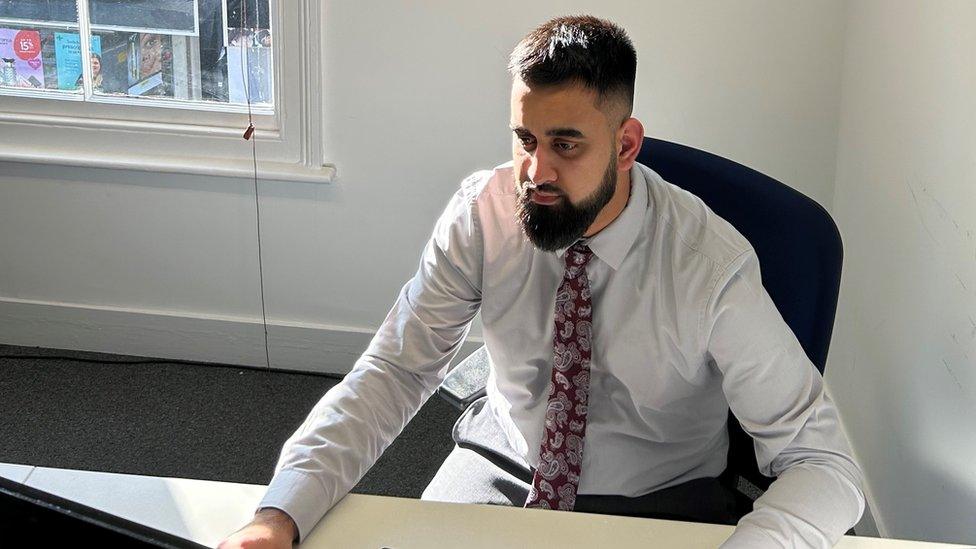Apprenticeships: East of England apprentices share their advice
- Published
Following a drop in numbers due to the Covid-19 outbreak, the number of young people taking up apprenticeships is back on the rise. Figures for the 2021/22 academic year, external showed almost 35,000 people started an apprenticeship in the East of England. They offer a different type of career path to those who head straight to university, with a chance to learn skills in the real world from the outset and the opportunity to earn a salary. What do some of the latest crop of apprentices think?

'This is the start of my career'

In the first year of Jainna's apprenticeship she was highly commended in the Multicultural Apprenticeship Awards
Jainna Bhalla, 19, lives in London but commutes to Basildon in Essex for her apprenticeship at aerospace security and defence company, Leonardo.
With four A*s in her A-levels, her teachers wanted her to go to Cambridge or Oxford, but instead she decided to pursue a level 6 project management degree apprenticeship.
As soon as she was offered the job, she jumped in the car with her parents and drove to her new office, to check out the route she would be taking.
She says she remembers thinking: "This is the start of my new life, the start of my career and this is the start of what I expected for myself."

One thing Jainna has found helpful is having such a large and supportive community of apprentices around her
She says at times, being in such a male-dominated industry and coming into the job without studying any STEM (Science, Technology, Engineering, Maths) subjects for her A-levels, she has struggled with imposter syndrome.
However, she says she has settled in and learned many new skills.
Jainna has also found it important to go back into schools and raise awareness of the opportunities out there for young people.
"I want those students to have the support I didn't have," she says.
"There is a misconception [around apprenticeships] that you don't have a social life... but if you've got a great community you do get to experience that social side, but we also get a fun social side of work events and going to careers fairs."

'I thought I would get treated like the coffee maker'

The advice Henry would give to his younger self and other young people would be to not follow the pack
"It was sort of a last-minute decision, but in hindsight it was probably the best decision," says 19-year-old Henry Stothard, who is working with Suffolk County Council.
When he was in sixth form, Henry was one of the only people to go into an apprenticeship that was not within the trade industry.
"I looked into the geography space because that's what I was interested in and that's what I wanted to do my degree in. I found this one and it ticked all the boxes," he says.
During his project management apprenticeship, he has looked at how Suffolk can be more sustainable and has been going out into the community with thermal imaging cameras to assess property insulation.
He has also been assisting residents on how they can help themselves during the cost of living crisis.
Henry, from Colchester, says quite a few of his friends went to university, and although he may have enjoyed it, he says he definitely thinks an apprenticeship was right for him.

By doing an apprenticeship, Henry says he has already started his career and got into the workplace
Seeing the impact his projects have had is something he finds rewarding and the apprenticeship has also opened up other possible career paths.
"I can really go off and broaden beyond my job role," he says.
"I've had opportunities to go to different departments, speak to different people, go all over Suffolk and meet loads of people, even if it's out of my scope.
"I thought I would get treated like the coffee maker but no, you get treated exactly like an equal."

What is an apprenticeship?
A type of job which you can start at the age of 16, where you can work full-time whilst also being trained at either college or university.
An apprenticeship can range from one to five years to complete depending on the level of the qualification. Some people may do a Level 2 apprenticeship which is equivalent to GCSE level, whereas a Level 6 or 7 apprenticeship is equivalent to a degree.
Schemes like these can be done in a variety of industries from engineering, to agriculture, mechanics and more.
Source: BBC Bitesize

'I never had a background in law'

Raeece found his family to be really supportive when he said he wanted to do an apprenticeship
More than a year into his conveyancing apprenticeship, 21-year-old Raeece Sarwar is just as passionate as when he first walked through the door.
Originally he came into the law firm on work experience and said the transition from this to an apprenticeship was made easier after being thrown into the deep end on his first week.
"After two weeks they said please stay for a couple more weeks and we can definitely offer you an opportunity to do an apprenticeship," he says.
Raeece, from Bedford, was the first apprentice Hannah's Solicitors in Rushden, Northamptonshire, had taken on and he stands by the decision that it was the right route for him.
"I'm really sociable and I'm really bubbly, and the way I learn is from other people and the way they are doing it, and visually from someone teaching me face-to-face.
"I knew that was what my heart was set on."

During his apprenticeship, Raeece has found colleagues to be supportive
Before joining the firm he was studying computing at college and had no background in law, but ended up applying for his apprenticeship during the coronavirus outbreak.
He says: "It was definitely harder during Covid times, but you just have to keep on applying and applying, and never let rejection bring you back down because you only learn from it."
Despite not having a law background, he says there have been many opportunities and people around him to learn from and be mentored by, allowing him to soak up information like "a sponge".
"I went into law because I felt it allowed me to use my communication skills daily, especially in the area of law I am going into. Furthermore it's client-based work and I feel this is something I am passionate and also good at.
"You have the misconception that when you join an apprenticeship you're going to become the person for everyone who is printing stuff off and doing the tea for everyone… but I was completely wrong."

Find BBC News: East of England on Facebook, external, Instagram, external and Twitter, external. If you have a story suggestion email eastofenglandnews@bbc.co.uk, external
- Published25 August 2022
- Published18 August 2022
